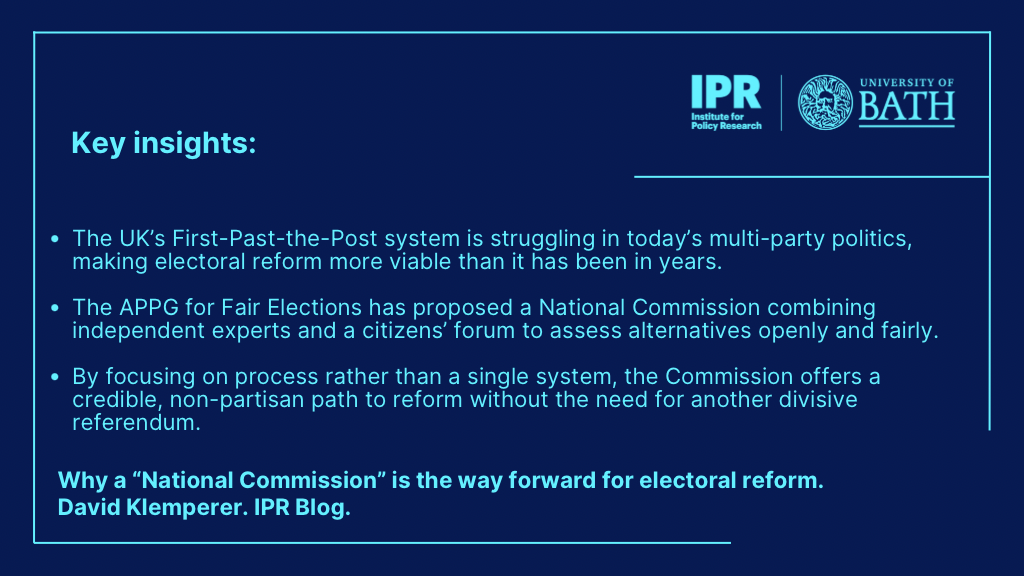Electoral reform is back on the UK’s political agenda as First-Past-the-Post strains under the pressures of multi-party politics. The new APPG for Fair Elections proposes a National Commission to explore alternatives through an open, non-partisan process involving experts and citizens. This innovative approach could finally deliver meaningful, legitimate reform without repeating past failures.
Before joining the IPR, Dr David Klemperer completed a PhD in History at Queen Mary University of London, exploring the intellectual development of social democratic politics in twentieth-century France. He has also previously been a Research Fellow at the Constitution Society (leading projects on turnout disparities and electoral reform), and a Research Assistant at the Institute for Government (analysing the Brexit process). Dr. Klemperer was consulted on an early draft of the Terms of Reference in his capacity as an independent expert, but has no other affiliation to the APPG for Fair Elections.
Electoral reform is once again on the agenda of UK politics. Not only does polling suggest that the public are more open than ever to electoral reform, but the UK’s current First-Past-the-Post (FPTP) electoral system is under increasing practical strain as our formerly-stable two-party system fragments into a multi-party politics. In the context of these new electoral dynamics, FPTP risks producing results that are not only highly disproportional, but that will also feel highly random, complicating elections for both parties and voters and potentially undermining the legitimacy of electoral outcomes. Whether to proportional representation (PR) or to some other kind of system, a change in how UK conducts its general elections feels more possible now than it has done in over a decade.
It is in this context that the recently-formed All-Party Parliamentary Group (APPG) for Fair Elections (which brings together over 130 MPs) has begun campaigning for the establishment of a “National Commission on Electoral Reform” – a new, time-limited deliberative body that would be set up by the government to assess the functioning of FPTP and to potentially recommend an alternative. Earlier this month, the APPG followed up its initial proposal by publishing a “Terms of Reference” for the mooted National Commission, sketching out some potential elements of its structure, remit, and process.
The APPG’s proposal is a bold one: unlike previous commissions established to consider electoral reform (such as the ill-fated Jenkins Commission established by the Blair government in 1997), the proposed National Commission’s leadership would be recruited from outside politics, and would also involve deliberation amongst randomly-selected members of the public. In addition – and again unlike the Jenkins Commission – the Terms of Reference for the National Commission do not pre-specify the criteria (such as “proportionality” or “preserving the constituency link”) according to which it should assess different electoral systems. Instead, they envisage that the National Commission itself should take responsibility for defining a set of criteria.
In other words then, the National Commission is designed to be an open-ended, participatory, and democratic deliberative process. This proposal is both timely and salutary. With electoral reform increasingly appearing to be a viable prospect, the idea of a National Commission on Electoral Reform offers a clear and credible route towards achieving it. Crucially, it is a route that both avoids the pitfalls that undermined previous electoral reform efforts, while ensuring that the crucial issue of which electoral system should replace FPTP will be approached in a suitable and legitimate fashion.
Firstly, in terms of surmounting the obstacles to electoral reform, the APPG’s proposal for a National Commission helpfully sidesteps the problem of internal disagreement amongst electoral reformers over which new electoral system to advocate. In the UK, these kinds of disagreements have historically been a major problem for electoral reform efforts. In the lead-up to the passage of the Representation of the People Act 1918, proposals emerging from the Speaker’s Conference to replace FPTP with a combination of two new electoral systems – the Alternative Vote (AV) and the Single Transferable Vote (STV) – were derailed by squabbling between parliamentary supporters of the two different systems, with the result that FPTP was ultimately retained. More recently, the YES campaign in the 2011 AV referendum was weakened by the fact that most of its leading figures would have preferred to be campaigning for PR.
Campaigning for a particular electoral system to replace FPTP would therefore be a strategic error, with the potential to prematurely open up debates and disagreements that would weaken the overall electoral reform project and shrink the coalition for change. The APPG is right to instead be pushing for the establishment of a structured, impartial process by which a new electoral system can then be chosen.
Secondly, the international evidence is clear that using non-partisan deliberative processes to design electoral reform proposals can play a crucial role in ensuring that they command public legitimacy. When electoral reform proposals are seen as the product of partisan wrangling, they frequently run into trouble: in 2011, the electoral reform proposal negotiated in the UK by the Conservative-Liberal Democrat coalition was overwhelmingly defeated in a referendum; in 2015, an electoral reform referendum called in Poland by a President in the midst of his re-election campaign failed to achieve validity due to its pitiful turnout of 7.8%.
By contrast, non-partisan deliberative processes have often had more success: in the 1980s, New Zealand’s Royal Commission on Electoral Reform – a body composed of independent experts, deliberating in the open through public hearings – played a crucial role in building a public consensus for an electoral reform proposal subsequently enacted in the 1990s; in the early 2000s, the Canadian province of British Columbia held a citizens’ assembly on the electoral system, whose proposal was then endorsed by a public vote. A National Commission of the sort being proposed by the APPG could therefore be an effective means to build public consensus around a particular electoral reform proposal.
Thirdly, in the UK context, the establishment of a National Commission could be a way around what has in recent years been a major obstacle to electoral reform: the erroneous idea that changing the electoral system would require a referendum. Although this is in no sense constitutionally mandated, the 2011 AV referendum has cemented in the minds of many politicians the notion that electoral reform is not something that it would be legitimate for Parliament to simply enact. However, the proposal for a National Commission offers an alternative means by which an electoral reform proposal could obtain additional legitimacy, and could thus smooth the way to convincing politicians that electoral reform could be passed and implemented without a divisive and time-consuming plebiscite.
Beyond these tactical advantages of a non-partisan deliberative process, the specific structure and remit proposed for the mooted National Commission on Electoral Reform is one well-suited to the task of evaluating electoral systems and deciding on a new one for the UK. Deciding upon an electoral system involves adjudicating on both technical and philosophical questions. While the precise functioning of different electoral systems is a highly technical matter (on which it is wise to consult experts), the choice of which one to adopt is not a technical question: rather, it depends on more basic issues of what it is we want our electoral system to do, what kinds of “representation” we view as most important, and how we understand democracy.
For instance, should voters be able to choose between different individual candidates, or just between political parties? Should political representation be about place or opinion? How important is the accountability of individual politicians to specific groups of voters? And should the electoral system be designed to allow voters to choose between alternative governments, or simply to express their sincere political beliefs? These questions all involve fundamental trade-offs between different democratic values and preferences; they cannot therefore be answered technocratically.
The APPG’s Terms of Reference appear to acknowledge this, since they suggest that the National Commission would combine both technocratic and deliberative elements: in addition to a team of seven independent commissioners supported by a secretariat, there would be an “Expert Panel” made up of academics and practitioners, and a “Voters’ Forum” made up of 100 randomly-selected members of the public (in essence, a miniature citizens’ assembly).
The overall remit of the National Commission would be to adjudicate both on “the criteria for a suitable voting system for general elections in modern Britain” and “[b]ased on these criteria, on balance, which voting system would best serve modern Britain”. However, the Terms of Reference suggest a division of labour: the “Voters’ Forum” would be tasked with deliberating on “principles and values”, and the criteria by which different electoral systems (including FPTP) should be assessed; by contrast, the “Expert Panel” would be consulted on “voting system design” and “the features and performance of different voting systems” in the places they are used.
The structure of the National Commission is thus admirably adapted to the nature of the issues it is designed to address – fundamental questions of democratic principle will be determined by randomly-selected citizens, while technical matters can be adjudicated by experts. This will ensure an ultimate proposal reflecting the preferences and priorities of ordinary voters, rather than necessarily reflecting those of long-time electoral reform advocates.
Finally, it is worth noting that although FPTP’s manifest failings mean the outcome of this process would almost certainly be electoral reform of some kind, it is not certain that it would be of the kind traditionally advocated by electoral reformers – in other words, some kind of PR. By admirably refusing to pre-define the criteria according to which the National Commission would assess alternatives to FPTP, its advocates have left open the possibility that it may not recommend some form of PR; it could instead propose a new majoritarian system that retains single-member districts – such Australian-style AV, or a French-style double ballot.
From my perspective, this can only be seen as a positive: not only will this open-endedness likely enhance the quality of the process and the legitimacy of its ultimate outcome, but the electoral reform debate has in recent years been too limited by the electoral reform movement’s monomaniacal focus on PR. Many majoritarian systems have much to recommend them and deserve be considered as serious options.
All articles posted on this blog give the views of the author(s), and not the position of the IPR, nor of the University of Bath.
Respond





